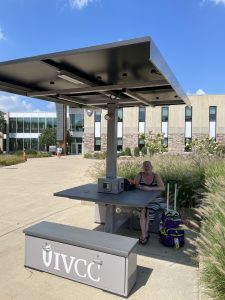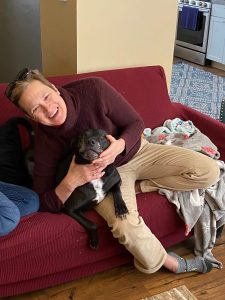Living with anxiety
Students share their struggles, successes
November 30, 2017
The Anxiety and Depression Association of America reports that anxiety disorders affect over 40 million adults in the United States. These common disorders are highly treatable, but only 36.9% of those affected receive treatment.
Anxiety disorders affect a large proportion of college students. IVCC freshman Arielle Juarez is one of the many students who lives with anxiety at IVCC.
“Attending school and making it through the day is always difficult,” said Juarez. “I have very high expectations for myself, so my anxiety is always giving me a hard time.”
A 2006 study found that only two percent of college students indicated that they would seek help from a mental health professional in times of need. Fortunately, Juarez chose to seek help for her anxiety.
“The Disability Center and Tina Hardy have truly helped me,” she said. “I have a hard time taking tests and focusing in a classroom with many students. Tina has given me the help I need to feel more comfortable on test day.
“In high school, I was never offered an alternate testing area or extended test time. These things are truly helpful to me.”
Juarez believes that seeking help is nothing to be ashamed of.
“I would strongly encourage students to seek professional help,” she said. “If I had not looked for professional help, I would not have been exposed to medications or techniques that truly do work to stop an anxiety attack. Seeking help or guidance is truly helpful.”
Juarez is not alone in her struggles. Among many others, IVCC student Brittney Hill of Utica is another individual who struggles with anxiety.
“Anxiety affects [my life] tremendously,” Hill said. “It makes it really hard to be successful in class. It can be hard at times and feel really overwhelming.”
Anxiety affects all aspects of Hill’s life, including taking tests.
“If I see everyone else getting up and turning their stuff in, then I start to panic,” she said. “Once I start freaking out, my mind goes blank and I can’t think anymore.”
Hill chose to work with IVCC’s Disabilities Services so that she could take her tests in a different room with no time limit. Hill has also learned coping mechanisms through her enrollment in a T’ai Chi course at IVCC.
“We learn movements about how to relax your body,” she said. “[The teacher] has taught me that if you just sit down and imagine your weight suspending from your tailbone, it feels like your airways open up.”
This allows Hill to slow down or prevent anxiety attacks by taking control of her breathing. She believes that while mental illnesses are sometimes glamorized, it is important to talk about it.
“Some people are ashamed to say they are struggling so they don’t reach out for help,” Hill said. “If you do ask for help, you are more likely to be successful. I used to not say anything and my grades suffered because of that.”
Homework and tests can often trigger anxiety disorders. With finals approaching, many students are starting to feel extremely stressed. In fact, the American College Health Association found that 48% of college students feel overwhelmed by all they have to do.
While it is difficult to balance school with life, Hill tries her best to keep a positive outlook.
“It’s hard to balance it out,” she said. “You can’t give up. You’ve just got to keep trying.”
Multiple studies have found that those who suffer from mental illnesses often feel hesitant to seek professional help. Seeking professional help is not a sign of weakness; rather, it is a sign of strength.
In addition to the services that IVCC provides, professional help can be found within the community at facilities such as Illinois Valley Counseling Services. IVCS is located in Ottawa and specializes in meeting the needs of children, adolescents and adults. IVCS believes that “many of [their] clients are successful individuals who know that everyone has the potential to grow and change” and can be reached at 815-993-1614.




